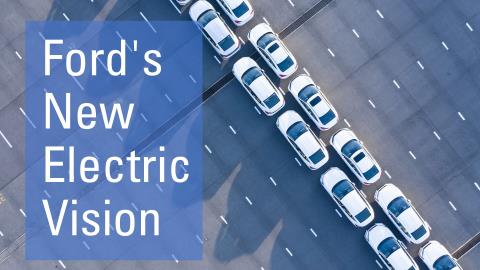Ford Motor has long relied on its profitable large trucks and SUVs in the U.S. market, but the automaker is now banking on smaller, more affordable electric vehicles (EVs) to drive its future success. This strategic shift is aimed at ensuring a more capital-efficient and profitable EV business, according to Marin Gjaja, the chief operating officer for Ford’s Model e EV unit.
Ford’s new plan serves as an “insurance policy,” allowing the company to expand its popular hybrid models while creating affordable electric vehicles. Gjaja explained, “We’re convinced that the highest adoption rates for electric vehicles will be in the affordable segment of the market.” Ford is targeting smaller EVs to stay competitive, particularly against Chinese automakers like BYD, which are rapidly expanding beyond their home market.
As part of this updated EV strategy, Ford has committed up to $1.9 billion in investments, which includes $400 million for the write-down of manufacturing assets and $1.5 billion for additional expenses. The automaker has made some tough decisions, including canceling a large three-row electric SUV and delaying production of its next-generation “T3” electric full-size pickup truck until late 2027.
Instead, Ford plans to launch a commercial EV van in 2026, followed by a midsize electric pickup in 2027 and then the delayed T3 truck. The decision to shift away from larger EVs reflects the economic challenges posed by the weight and cost of battery packs needed for such vehicles. Ford CEO Jim Farley has acknowledged that while larger vehicles provide higher margins in traditional internal combustion engine (ICE) vehicles, the opposite is true for EVs.
Currently, Ford’s EV lineup, including the Mustang Mach-E crossover, the F-150 Lightning, and a commercial van, is not profitable. The Model e operations have incurred significant losses, with nearly $2.5 billion lost in the first half of this year and $4.7 billion in 2023.
Despite these challenges, Ford’s decision has received support from investors and analysts. The company’s shares have risen by 2.3% following the announcement of the new strategy. John Murphy of BofA noted that the tough decision to pivot towards smaller EVs will likely pay off in the medium to long term as Ford positions itself to benefit from growing demand for electric vehicles.
By focusing on affordable EVs and leveraging its strengths in smaller vehicles, Ford aims to establish a more sustainable and profitable path in the competitive electric vehicle market.



